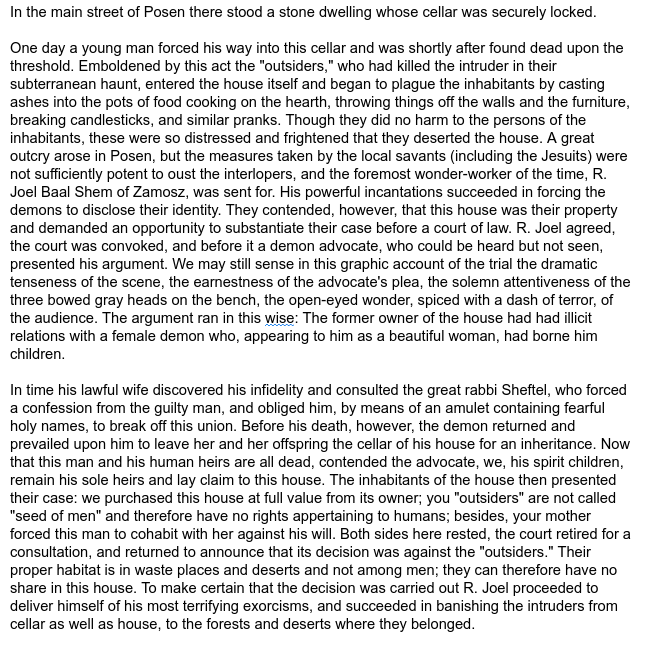I wrote up a version of an old folktale. I hope someone finds it inspirational.
There was once a tree, and within lived a demon. It stretched itself over the Rab’s house, and often the Rab’s son would play nearby. One day the boy saw a finger poking out of the tree, and thinking that one of his friends was playing a trick on him, he fished a ring from his pocket and placed it on the finger. Suddenly a face appeared beneath the bark of the tree, a great smile upon it. He ran away from it, screaming.
The boy eventually forgot the event and grew up, himself becoming a Rab as well. He wed a respectable and wealthy woman, then settled into his father’s house. One day a branch from the tree slammed into his new bride, killing her instantly. Although the new Rab had not cared deeply for this woman, he still grieved for over a year before again agreeing to wed another woman of means. She too was struck by a branch from the tree and was killed instantly.
Finally the Rab decided that G-d must be punishing him for only wedding for social status and wealth. Thus he married a poor woman whom he loved very deeply, and they quickly made a life together. Knowing what had befallen his two earlier wives, the woman set herself to avoid the same fate. Eventually the tree did mean to strike her, but she was able to avoid its quick branches and declare, “Why do you do this? Why do you kill all who love my husband?”
The demon within tree then revealed itself and replied, “Because we were wed long ago, and he is mine under law.” The woman returned home and recounted the tale to her husband, who then recalled the events of his childhood and confirmed the demon’s story. Hearing this, she decided to go to the demon and treat with it.
The woman admitted that the demon was right: her husband belonged to the demon, as was law. A deal was then struck: the demon would abstain from harming her, provided that the woman brought it an offering each day of its favorite food: smoke captured in a pot. A deal was struck, and thereafter each morning the woman would return to the tree and find a pot resting there. She would light a piece of wood within it and close the pot. And so it went.
A few years later the wife became pregnant. Knowing that the demon would likely harm her child, or worse claim it as its own, the woman returned once more to treat with the demon. A new deal was struck: in exchange for her family’s safety, the demon could have her husband every Saturday for one hour.
And so it went for seven years. The child was healthy and the family happy. The demon wife even came to the family’s aid at times. One Saturday evening when the husband came to the demon’s tree he found the pot sitting there before it. Within was a familiar gold ring, and he knew that now the demon was gone.

